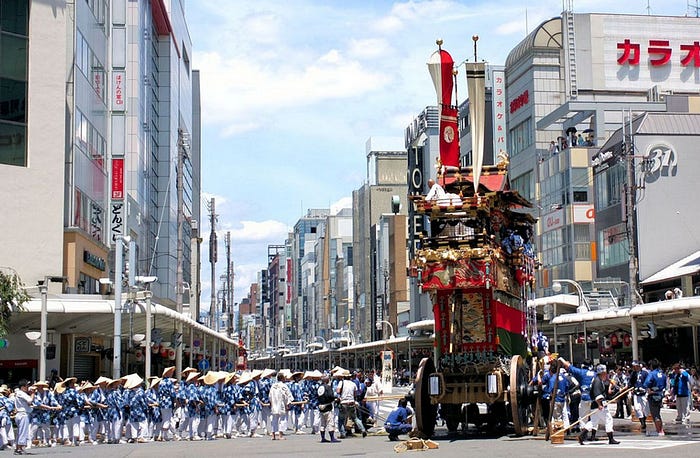The Gion Festival (Gion Matsuri) is one of Japan’s most iconic and enduring cultural celebrations, held annually in Kyoto throughout the month of July. With over a millennium of history, this vibrant Shinto festival transforms the city into a living gallery of tradition, artistry, and community spirit. In 2025, the festival promises another unforgettable experience, blending ancient arts with lively street festivities.
🎎 Origins and Significance
The Gion Festival traces its roots back to 869 CE, originating as a purification ritual to appease the gods during a time of plague. Centered around Yasaka Shrine, the festival has evolved into a grand celebration featuring elaborate processions, traditional music, and communal gatherings, all aimed at warding off misfortune and bringing prosperity.

📅 Key Events in 2025
The 2025 Gion Festival unfolds over the entire month of July, with a series of events that captivate both locals and visitors.
- July 1–5: Opening ceremonies and neighborhood preparations mark the commencement of the festival
- July 10–13: Construction of the magnificent Yamaboko floats begins, showcasing the craftsmanship of local artisans.
- July 14–16: Yoiyama Evenings precede the first grand procession, featuring illuminated floats, traditional music, and bustling street markets.
- July 17: Saki Matsuri Yamaboko Junko (First Float Procession) takes place, where towering floats parade through Kyoto’s main streets.
- July 21–23: Additional Yoiyama festivities lead up to the second grand procession.
- July 24: Ato Matsuri Yamaboko Junko (Second Float Procession) offers a more serene and reflective counterpart to the earlier parade.
- July 31: The festival concludes with a closing service at Eki Shrine, bringing the month-long celebration to an end.
🎐 Cultural Highlights
- Yamaboko Floats: These intricately decorated floats, some towering up to 25 meters, are adorned with tapestries, carvings, and historical artifacts, earning the procession the nickname “moving museum.”
- Traditional Attire: Participants and attendees often don yukata (summer kimono), adding to the festival’s vibrant atmosphere.
- Street Food and Stalls: The festival streets come alive with vendors offering local delicacies like takoyaki (octopus balls), yakitori (grilled chicken skewers), and kakigori (shaved ice), providing a feast for the senses.
🌟 Tips for Visitors
- Plan Ahead: Accommodations in Kyoto fill up quickly during July. It’s advisable to book lodgings well in advance.
- Stay Hydrated: Kyoto summers can be hot and humid. Carry water and wear comfortable clothing to stay cool during the festivities.
- Respect Traditions: While photography is welcomed, be mindful of local customs and avoid obstructing processions or entering restricted areas.
The Gion Festival 2025 offers a unique opportunity to immerse oneself in Japan’s rich cultural tapestry. Whether you’re drawn by the historical significance, the artistic displays, or the communal spirit, this month-long celebration in Kyoto is sure to leave a lasting impression.
For more information and updates, visit the official Gion Festival website: https://www.gionfestival.org/
Comments
Post a Comment